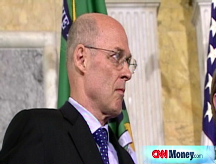Bonds rise as bailout details remain fuzzy
Investors look for safety as lawmakers debate the terms of a massive government intervention in the financial services sector.
NEW YORK (CNNMoney.com) -- Prices for government bonds rose Tuesday as details of the government's proposed $700 billion bailout of the financial services industry remained sketchy.
Treasury Secretary Henry Paulson and Federal Reserve Chairman Ben Bernanke appeared before Congress to urge swift action on the proposal, which would use tax dollars to purchase soured mortgage-backed securities from Wall Street firms.
Paulson told the Senate Banking committee that passage of the bailout was necessary "to avoid a continuing series of financial institution failures and frozen credit markets that threaten American families' financial well-being, the viability of businesses both small and large, and the very health of our economy."
While most lawmakers agree that something needs to be done to stave off further damage to the financial system, some Democratic members of Congress have expressed misgivings about the proposal in its current form.
"It's hard to get a feel for what legislation will look like, and that creates uncertainty" said Steve Van Order, chief fixed income strategist at Calvert Funds.
Until a more precise outline of the bailout plan emerges, "Treasurys are going to trade in reaction to stocks," Van Order said.
Stocks churned in midday trading Tuesday, as an early modest rally lost momentum and all three indexes turned lower amid ongoing economic concerns.
The benchmark 10-year note rose 1/32 to 101 20/32, while its yield fell to 3.80% from 3.88% late Monday. The 30-year long bond dipped slightly to 101 28/32 and its yield was to 4.38%, down from 4.45%. Bond prices and yields move in opposite directions.
The jitters that dominated the market last week are still weighing on investors minds, said Bill Larkin, a portfolio manager at Cabot Money Management in Boston.
"People are still spooked," Larkin said. And that nervousness continues to fuel demand for shorter-term bonds, he added.
The 2-year bond added 1/32 to 100 18/32 with a yield of 2.07%, down from 2.20% in the previous session. The price of the 3-month note, which is often viewed as a safer short-term bond investment, also failed to gain traction, dropping to 25/32. Meanwhile, the yield on the 3-month note was down to 0.80% from 0.94% Monday.
Nervous investors had piled into short-term bonds last week, sending the yield on the 3-month bond to a 68-year low during one of the most volatile weeks in Wall Street's history.
Government backed bonds are perceived as a safe-haven investment and demand for Treasurys usually rises when economic conditions deteriorate.
"We're in a very defensive mode and people are looking for protection," Larkin said. ![]()



